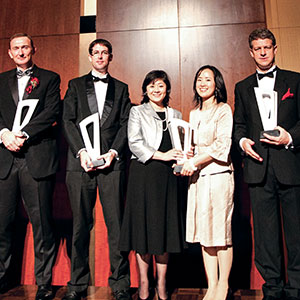Can a snap election get it back on target?
With Japan’s economy officially in recession, following two consecutive quarters of GDP decline, it would appear that the much-heralded success of Prime Minister Shinzo Abe’s three-arrow approach to economic well-being has not lived up to its promise.
Two of the three arrows appear to have hit their targets successfully. In fact, other economies in Europe and even Washington began to take Japan as a potential model for revival. And, why not? The country did experience a surprising surge in the stock market, and the yen–dollar exchange rate reached unexpectedly positive new levels.
Quantitative easing appeared to be the way forward, with the European Central Bank seriously considering a similar approach.
But, the third arrow in the quiver—realistic structural reform, including often-resisted measures to open markets—has not yet been realised, and many commentators now question whether it ever can be.
For all the recent good news about Japan’s economy, and the belief of many experts that it was on the fast track to recovery, the fact is that the recent increase in consumption tax from 5% to 8% has put a brake on household spending, as many predicted it would.
Though further growth had been anticipated in the last quarter, the economy actually shrank by an alarming 1.6%. The plan for another consumption tax increase, to 10%, next year has further alarmed analysts.
Such is the concern that Abe, who inherited the tax-increase policy from a previous Democratic Party of Japan administration, and who was reportedly pressed into implementing it by Japan’s Ministry of Finance, has opted to delay the second stage increase to the spring of 2017.
In an attempt to garner support for his strategies—and just midway through his term of office—he has also called a snap election for 14 December. The ruling coalition suggests that they will put forward proposals aimed at lowering the tax rate on daily necessities, such as food.
Already, however, critics are calling this yet another example of the indecisiveness of the ruling bloc.
Allowing the sort of tax breaks suggested may be appealing to the electorate, but they will have the effect of lowering tax revenue. This would appear to contradict the purpose of an overall rise, and will result in yet more complex administration, particularly for smaller firms.
It is for this reason that the Ministry of Finance is believed to be against the postponement. Here again, we see a sharp difference between the ministry, which is insisting on more stringent economic discipline, and supporters of Abenomics, who appear bent on monetary stimulus.
Opinions are also sharply divided over the wisdom of calling a snap election. Certainly, it is a tactic that gives the opposition little time to prepare (although given the amount of speculation, they can hardly have been taken entirely unawares), but it is one that could also backfire.
While stocks rose sharply on the announcement of the tax-hike postponement, it is unclear whether prices will remain stable given the uncertainty generated by an election.
That is particularly the case in an election like this, in which the government is seeking a mandate for a policy that is, to most of the electorate, unpopular. Recent opinion polls show that the majority of respondents feel less well off than just a year ago. In real terms, incomes have fallen.
Abe’s popularity at large has taken a significant knock. Economics aside, his determination to make changes to the Constitution of Japan (especially in relation to Article 9) has alarmed those who fear the country may swing even further to the right.
Despite his comments that the Japan–China relationship should no longer be based on emotional issues, moderates worry that his nationalistic statements are hindering, rather than helping, the situation in the region.
Some are even referring back to his previous term as prime minister (2006–07) which was largely seen as a singular failure. But Abe is a survivor; politics is in his blood.
His grandfather was a politician; his father, Shintaro, was the country’s longest-serving foreign minister; and his mother, Yoko, was the daughter of Nobusuke Kishi who was prime minister from 1957 to 1960.
It will be interesting to see whether his political intuition will serve him well come election day and, further, what a renewed mandate from the people (assuming that he succeeds) will encourage him to do next.






